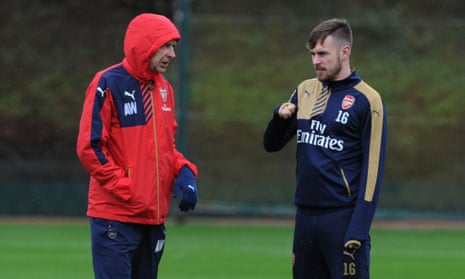Arsène Wenger says the climate in Premier League football is “more destabilising than ever before” and, when the Arsenal manager looks around at England’s other big clubs, the point is strongly reinforced.
Louis van Gaal is on the edge at Manchester United, Manuel Pellegrini must contend with the spectre of Pep Guardiola at Manchester City, and Chelsea and Liverpool have sacked their managers this season. There will be a further change at Chelsea next summer when the caretaker, Guus Hiddink, is replaced by a permanent appointment.
Wenger and Arsenal are the exception. Wenger has been in situ since 1996 and there have been no dramas surrounding his position for some time. He appears the epitome of stability and that impression extends to his squad.
There was plenty of angst attached to Wenger’s decision to stick with what he had last summer and sign no new outfield players. But he has always felt slow and steady could win this title race and that unsexy values such as continuity, trust and incremental improvement may hold the key.
The approach is looking good before the Boxing Day visit to Southampton. As others have lost their heads Arsenal have generally kept theirs and they are now the favourites for the title, even though they must still visit the Manchester clubs, Liverpool and Tottenham Hotspur.
“The society today always wants something new,” Wenger said. “We have news every half an hour or every minute. You need to announce something new. But let’s not forget that football is as well about cohesion, about stability. That goes a little bit against the demand of what people want but I still think success is linked with talent and cohesion. Cohesion is an under-rated factor in our society because there is always a demand for something new.
“It’s more difficult today because people are better informed. They know more straight away. When a team loses a game everybody has an opinion and the environment is more destabilising than it ever was before. So maybe inside the clubs this kind of cohesion and resistance to that destabilising factor becomes more important.”
Arsenal have been the form club over this calendar year and Wenger noted one of the reasons had been their defensive improvement for which Petr Cech, the goalkeeper who arrived last summer from Chelsea, can take some of the credit.
Wenger talked about why he did not sign another striker, for example, because in his view Olivier Giroud, Theo Walcott, Alexis Sánchez and Danny Welbeck each represented a “world-class” pick. Giroud has 12 goals in his past 14 appearances for Arsenal.
Wenger said: “When I looked at the market there were players you had to spend a huge amount of money on and were they better than those four players? I don’t know. Firstly [the demand for new signings] is most of the time to calm anxiety for the fans. It is reassuring to have a big name come in and, secondly, the media put you under pressure to get a new name.

“You need competition and competition exists if the numbers are not too short or not too big. When the number is too big, there is no competition any more and it goes against the interests of the team. If a player is No26 in the squad, he needs three players to die before he has a real chance to play.
“That has an impact when he comes in every morning. He is down and he takes something away from the team. When the number is too short, he thinks: ‘No matter how I am, I play.’ And that is not good as well. I felt we have the right number.”
To further the theme of continuity, Wenger said that Mikel Arteta, the club captain, could “be a coach in the future and certainly here” at Arsenal. Arteta has not played since the 2-1 defeat at West Bromwich Albion on 21 November because of a calf problem that Wenger said was similar to the one the midfielder suffered last season, which eventually needed surgery.
Arteta was ruled out from late November of last year for the rest of the season. It is hoped the 33-year-old, who is out of contract in the summer, could be back in two to three weeks’ time.
“Could he join my coaching staff? I don’t rule that out,” Wenger said. “He has to be a youth-team coach first and, after, come up. At the moment I don’t have a real need although the average age is quite high on my staff! I am happy with all my staff. I think Mikel can be a coach in the future and certainly here.
“He has the same injury. He was close [last season] to be back but every time I took a gamble and put him back in he had a setback. So this time I want to be a little more cautious and get him to play one or two games in the reserves before he comes back and plays.”
Wenger believes that Jamie Vardy, the Leicester City striker, is worth the £30m fee that has been talked about. Leicester are determined not to lose him in January but they could receive bids.
“Without a doubt he is worth that money today,” Wenger said. “If you put that in the context of the financial power today of the top clubs, £30m is not that massive for a striker. He is the best goalscorer in the league and you have many players under him who have been paid much more and who don’t score that number of goals.”
